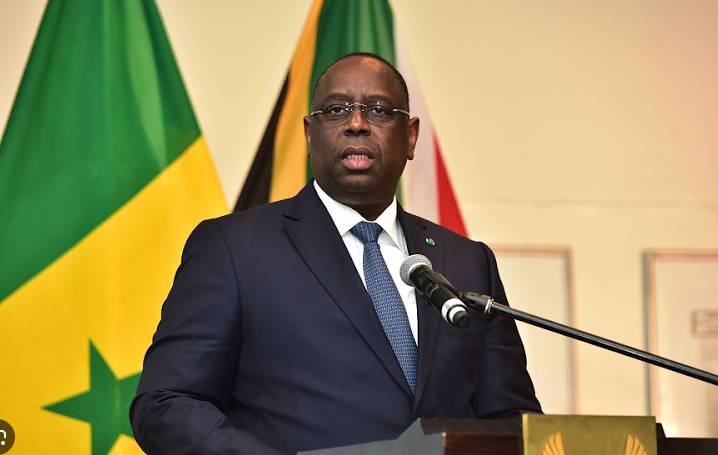Senegal president says France should close military bases
Chad foreign minister says ending military cooperation with France

Stay tuned with 24 News HD Android App

Senegal's President Bassirou Diomaye Faye told AFP Thursday that France should close its military bases in the West African state as it prepared to mark the 80th anniversary of a notorious colonial slaughter.
Faye said that France's President Emmanuel Macron had admitted that his country's troops were responsible for a "massacre" of Senegalese soldiers in 1944.
Faye hailed the acknowledgement but said that allowing French bases in the country was incompatible with national sovereignty.
"Senegal is an independent country, it is a sovereign country and sovereignty does not accept the presence of military bases in a sovereign country," Faye said in an interview at the presidential palace.
Faye swept to power in March's elections promising to assert Senegal's sovereignty and an end to dependence on foreign powers.
He however maintained that the act did not constitute a break with France, like those seen elsewhere in west Africa in recent years.
"Today, China is our largest trading partner in terms of investment and trade. Does China have a military presence in Senegal? No. Does that mean our relations are cut? No," he said.
- 'Making amends' -
Several other francophone countries in west and central Africa, including Mali, Burkina Faso and Niger, have been taken over by military juntas that have expelled French forces and turned to Russia for security aid instead.
Two French government sources told AFP this year that the country was looking to cut its military presence in Africa -- from 350 troops to 100 in Senegal and Gabon and to 300 in Chad from 1,000 and 100 in Ivory Coast from 600.
"France remains an important partner for Senegal for the investment for Senegal and the presence of French companies and even French citizens who are in Senegal," said Faye.
Senegal's president said he had received a letter from Macron admitting French culpability for a World War II-era massacre at Thiaroye on December 1, 1944.
The atrocity has long been a bone of contention between Paris and Dakar.
In November 1944, around 1,600 African soldiers who had fought for France and been made prisoners of war by Germany, were sent back to Dakar, according to French historian Armelle Mabon.
Soon after arriving at the Thiaroye camp, just outside Dakar, they protested against pay delays, with some refusing to return to their home countries without their dues.
French forces opened fire on the protesters, killing at least 35, though historians say the toll could be much higher.
"I received today a letter from President Emmanuel Macron in which he acknowledges that it was a massacre, very clearly, unambiguously on the terms," Faye said.
He praised "a great step" taken by the French leader, who Faye said apologised for not being able to make the commemoration of the massacre's 80th anniversary.
Faye said he was considering demanding an apology from France.
"To recognise that a massacre has been committed must obviously have the effect of making amends.... we think that naturally this is what must follow."
Chad ends military cooperation with France
Chad announced Thursday that it was ending military cooperation with former colonial power France, just hours after a visit by French Foreign Minister Jean-Noel Barrot.
"The government of the Republic of Chad informs national and international opinion of its decision to end the accord in the field of defence signed with the French republic," foreign minister Abderaman Koulamallah said in a statement on Facebook.
Chad is a key link in France's military presence in Africa, constituting Paris's last foothold in the Sahel after the forced withdrawal of its troops from Mali, Burkina Faso and Niger.
"This is not a break with France like Niger or elsewhere," Koulamallah, whose country still hosts around a thousand French troops, told AFP.
At a press briefing after a meeting between President Mahamat Idriss Deby and Barrot, Koulamallah called France "an essential partner" but added it "must now also consider that Chad has grown up, matured and is a sovereign state that is very jealous of its sovereignty".
Barrot, who arrived in Ethiopia on Thursday evening, could not immediately be reached for comment.
- 'Historic turning point'-
Chad is the last Sahel country to host French troops.
It has been led by Deby since 2021, when his father Idriss Deby Itno was killed by rebels after 30 years in power.
The elder Deby frequently relied on French military support to fend off rebel offensives, including in 2008 and 2019.
The landlocked nation faces a potent threat from Boko Haram and other militant groups.
It borders the Central African Republic, Sudan, Libya and Niger, all of which host Russian paramilitary forces from the Wagner group.
Deby has sought closer ties with Moscow in recent months, but talks to strengthen economic cooperation with Russia have yet to bear concrete results.
Koulamallah called the decision to end military cooperation a "historic turning point", adding it was made after "in-depth analysis".
"Chad, in accordance with the provisions of the agreement, undertakes to respect the terms laid down for its termination, including the notice period", he said in the statement, which did not give a date for the withdrawal of French troops.
The announcement comes just days after Senegal's President Bassirou Diomaye Faye indicated in an interview with AFP that France should close its military bases in that country.
"Senegal is an independent country, it is a sovereign country and sovereignty does not accept the presence of military bases in a sovereign country," Faye told AFP on Thursday.
